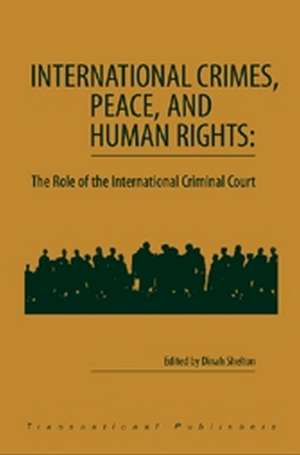International Crimes, Peace, and Human Rights: The Role of the International Criminal Court
Autor Dinah Sheltonen Limba Engleză Hardback – 30 sep 2000
The book's detailed analysis of the potential uses (and misuses) of the Statute—its lacunae and shortcomings as well as its signal advances in jurisdiction and accountability—make International Crimes, Peace and Human Rights a significant reference and guide, not only to the Rome Statute, but also to the Court's jurisprudence as it develops in the coming years and decades.
Published under the Transnational Publishers imprint.
Preț: 857.18 lei
Preț vechi: 1045.34 lei
-18% Nou
Puncte Express: 1286
Preț estimativ în valută:
164.10€ • 168.76$ • 136.14£
164.10€ • 168.76$ • 136.14£
Carte indisponibilă temporar
Doresc să fiu notificat când acest titlu va fi disponibil:
Se trimite...
Preluare comenzi: 021 569.72.76
Specificații
ISBN-13: 9781571051387
ISBN-10: 1571051384
Pagini: 358
Dimensiuni: 155 x 235 mm
Greutate: 0 kg
Editura: Brill
Colecția Brill | Nijhoff
ISBN-10: 1571051384
Pagini: 358
Dimensiuni: 155 x 235 mm
Greutate: 0 kg
Editura: Brill
Colecția Brill | Nijhoff
Cuprins
Contributors; Introduction; Part I: Precedents and Their Lessons;
Chapter 1: The Experience of Nuremberg, Benjamin Ferencz;
Chapter 2: The Contribution of the International Criminal Tribunal for Rwanda to Reconciliation in Rwanda, Alinikisa Mafwenga;
Chapter 3: The Contribution of the International Criminal Tribunal for the Former Yugoslavia to Reconciliation in Bosnia and Herzegovina, Sandra Coliver;
Part II: A Merger of International Criminal Law, Humanitarian Law, and Human Rights Law?
Chapter 4: Toward International Human Rights Crimes: An Asian Perspective on Human Rights and
International Criminal Law, Clarence Dias;
Chapter 5: How the International Criminal Court Should Help Implement International Humanitarian Law,
Patrick Zahnd;
Chapter 6: Women’s Issues in International Criminal Law: Recent Developments and the Potential
Contribution of the ICC, Kelly Dawn Askin;
Chapter 7: International Human Rights Law, International Humanitarian Law, and International Criminal
Law and Procedure: New Relationships, Juan E. Méndez;
Part III: International Public Policy and the ICC: Accountability, Deterrence, and Redress;
Chapter 8: Amnesty and the International Criminal Court, Naomi Roht-Arriaza;
Chapter 9: Domestic Amnesties and International Accountability, Garth Meintjes;
Chapter 10: The International Criminal Court and the Challenge of Deterrence, Gustavo Gallón;
Chapter 11: The Penalty Provisions of the ICC Statute, William A. Schabas;
Chapter 12: Reparations for Victims of International Crimes, Dinah L. Shelton;
Chapter 13: The Trust Fund of the ICC, Thordis Ingadottir;
Chapter 14: Are Reparations Appropriately Addressed in the ICC Statute?, Fiona McKay;
Part IV: Problems of Jurisdiction and Effectiveness;
Chapter 15: Complementarity and Its Discontents: States, Victims, and the International Criminal Court,
Madeline Morris;
Chapter 16: The United States and the ICC, David Scheffer;
Chapter 17: The ICC Statute: Protecting the Sovereign Rights of Non-Parties, Roger S. Clark;
Chapter 18: High Crimes and Misconceptions: The ICC and Non-Party States, Madeline Morris;
Appendix: Rome Statute of the International Criminal Court; Index;
Chapter 1: The Experience of Nuremberg, Benjamin Ferencz;
Chapter 2: The Contribution of the International Criminal Tribunal for Rwanda to Reconciliation in Rwanda, Alinikisa Mafwenga;
Chapter 3: The Contribution of the International Criminal Tribunal for the Former Yugoslavia to Reconciliation in Bosnia and Herzegovina, Sandra Coliver;
Part II: A Merger of International Criminal Law, Humanitarian Law, and Human Rights Law?
Chapter 4: Toward International Human Rights Crimes: An Asian Perspective on Human Rights and
International Criminal Law, Clarence Dias;
Chapter 5: How the International Criminal Court Should Help Implement International Humanitarian Law,
Patrick Zahnd;
Chapter 6: Women’s Issues in International Criminal Law: Recent Developments and the Potential
Contribution of the ICC, Kelly Dawn Askin;
Chapter 7: International Human Rights Law, International Humanitarian Law, and International Criminal
Law and Procedure: New Relationships, Juan E. Méndez;
Part III: International Public Policy and the ICC: Accountability, Deterrence, and Redress;
Chapter 8: Amnesty and the International Criminal Court, Naomi Roht-Arriaza;
Chapter 9: Domestic Amnesties and International Accountability, Garth Meintjes;
Chapter 10: The International Criminal Court and the Challenge of Deterrence, Gustavo Gallón;
Chapter 11: The Penalty Provisions of the ICC Statute, William A. Schabas;
Chapter 12: Reparations for Victims of International Crimes, Dinah L. Shelton;
Chapter 13: The Trust Fund of the ICC, Thordis Ingadottir;
Chapter 14: Are Reparations Appropriately Addressed in the ICC Statute?, Fiona McKay;
Part IV: Problems of Jurisdiction and Effectiveness;
Chapter 15: Complementarity and Its Discontents: States, Victims, and the International Criminal Court,
Madeline Morris;
Chapter 16: The United States and the ICC, David Scheffer;
Chapter 17: The ICC Statute: Protecting the Sovereign Rights of Non-Parties, Roger S. Clark;
Chapter 18: High Crimes and Misconceptions: The ICC and Non-Party States, Madeline Morris;
Appendix: Rome Statute of the International Criminal Court; Index;
Notă biografică
Dinah Shelton is Professor of International Law at Notre Dame Law School.
